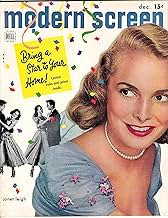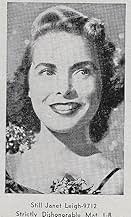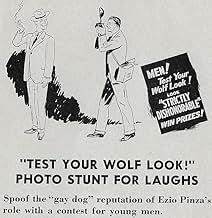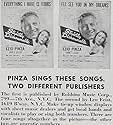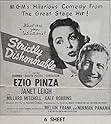Añade un argumento en tu idiomaAn Italian opera singer (Ezio Pinza) has a marriage of convenience with an innocent fan (Janet Leigh) from MississippiAn Italian opera singer (Ezio Pinza) has a marriage of convenience with an innocent fan (Janet Leigh) from MississippiAn Italian opera singer (Ezio Pinza) has a marriage of convenience with an innocent fan (Janet Leigh) from Mississippi
- Dirección
- Guión
- Reparto principal
Scott R. Beal
- Vendor
- (sin acreditar)
Douglas Carter
- Taxi Driver
- (sin acreditar)
Maurice Cass
- Little Man
- (sin acreditar)
Eileen Christy
- Girl at Railroad Station
- (sin acreditar)
Ken Christy
- Train Conductor
- (sin acreditar)
Lyle Clark
- Assistant Stage Manager
- (sin acreditar)
Harry Cody
- Conductor
- (sin acreditar)
Reseñas destacadas
This is not a great movie, or even a good one, frankly. I haven't read the 1929 Preston Sturges play on which it was based, or seen the 1931 movie that was first based on it. The play was a big hit on Broadway, so I find it hard to believe it could have been as bad as this movie. Why MGM agreed to put so poor a script into production - and it is a really poor script - I cannot begin to guess. According to another reviewer on here, this was a big money-loser for MGM. I'm not surprised. You won't be either if you decide to sit through it.
Pinza had a great career as one of the Metropolitan Opera's leading basses from 1926-1948. He then retired from opera, at age 56, and began a second career on Broadway and in a few movies. He started on Broadway opposite Mary Martin in one of the American musical theater's greatest hits, South Pacific, which opened a long run in 1949. His great success as Emile de Becque in that musical led to other musicals, most notably Fanny, and a few movies, such as this one in 1951, when Pinza was 59.
Pinza has some decent scenes opposite a much younger Janet Leigh, 24 and near the beginning of her movie career. This may seem strange, but remember that the early 1950s was an era of much older men, like Cary Grant (Charade, 1963), Gary Cooper (Love in the Afternoon, 1957), and Fred Astaire (Daddy Long-Legs, 1955), all then in their 50s, appearing opposite much younger women like Audrey Hepburn and Leslie Caron, who were then in their 20s. One previous reviewer speaks of "the magical chemistry of Pinza and Janet Leigh," another wrote that "they have wonderful chemistry together." I don't see that, but they do seem to be comfortable with each other, if not really drawn together sexually. (Pinza has to spend much of the movie pretending to try to control his desire for Leigh. It's not very convincing.)
Other than that: Leigh is supposed to be from Mississippi. This was a mistake, since her exaggerated southern accent keeps appearing and disappearing.
Pinza sings a few forgettable pop songs and has two opera scenes. They are what should count here, since people would have gone to see and hear him.
His second operatic number, "Le veau d'or" from Faust, is fun to watch, though the costumes are bad and the staging not good. It's fascinating to watch Pinza, at 59, jump on and off tables like a young man and really create a character. Still, there are parts that he does not sing particularly well. The subsequent scene of him hunting for Leigh in Grand Central Station while still in his Mefistopheles costume could have been a lot funnier if it had been handled by a better director.
The first opera scene is evidently from some made-up opera, with music by Hollywood composer Mario Castelnuovo-Tedesco. It appears to be about a Roman general who is returning to his wife Calpurnia. The music is generic, but the Italian libretto sounds real, and Pinza does a great job singing the forgettable music. His Italian diction, as always, was impeccable.
The best musical number is actually a scene in a movie theater where, after the end of the silent movie, the organist asks the audience to sing along, following the bouncing ball. When Pinza starts to sing over the collection of strictly amateur voices one would encounter in such a situation, the real glory of his voice astounds the audience, as it will you.
So, in sum, not a great movie. I found it harder to sit through on a second viewing, to the extent that I can't recommend it. Pinza doesn't sing much, and what he does sing is not particularly memorable. All the rest is downhill from there.
Pinza had a great career as one of the Metropolitan Opera's leading basses from 1926-1948. He then retired from opera, at age 56, and began a second career on Broadway and in a few movies. He started on Broadway opposite Mary Martin in one of the American musical theater's greatest hits, South Pacific, which opened a long run in 1949. His great success as Emile de Becque in that musical led to other musicals, most notably Fanny, and a few movies, such as this one in 1951, when Pinza was 59.
Pinza has some decent scenes opposite a much younger Janet Leigh, 24 and near the beginning of her movie career. This may seem strange, but remember that the early 1950s was an era of much older men, like Cary Grant (Charade, 1963), Gary Cooper (Love in the Afternoon, 1957), and Fred Astaire (Daddy Long-Legs, 1955), all then in their 50s, appearing opposite much younger women like Audrey Hepburn and Leslie Caron, who were then in their 20s. One previous reviewer speaks of "the magical chemistry of Pinza and Janet Leigh," another wrote that "they have wonderful chemistry together." I don't see that, but they do seem to be comfortable with each other, if not really drawn together sexually. (Pinza has to spend much of the movie pretending to try to control his desire for Leigh. It's not very convincing.)
Other than that: Leigh is supposed to be from Mississippi. This was a mistake, since her exaggerated southern accent keeps appearing and disappearing.
Pinza sings a few forgettable pop songs and has two opera scenes. They are what should count here, since people would have gone to see and hear him.
His second operatic number, "Le veau d'or" from Faust, is fun to watch, though the costumes are bad and the staging not good. It's fascinating to watch Pinza, at 59, jump on and off tables like a young man and really create a character. Still, there are parts that he does not sing particularly well. The subsequent scene of him hunting for Leigh in Grand Central Station while still in his Mefistopheles costume could have been a lot funnier if it had been handled by a better director.
The first opera scene is evidently from some made-up opera, with music by Hollywood composer Mario Castelnuovo-Tedesco. It appears to be about a Roman general who is returning to his wife Calpurnia. The music is generic, but the Italian libretto sounds real, and Pinza does a great job singing the forgettable music. His Italian diction, as always, was impeccable.
The best musical number is actually a scene in a movie theater where, after the end of the silent movie, the organist asks the audience to sing along, following the bouncing ball. When Pinza starts to sing over the collection of strictly amateur voices one would encounter in such a situation, the real glory of his voice astounds the audience, as it will you.
So, in sum, not a great movie. I found it harder to sit through on a second viewing, to the extent that I can't recommend it. Pinza doesn't sing much, and what he does sing is not particularly memorable. All the rest is downhill from there.
Seeing it on a very old DVD practically on its last legs and as a fan of Ezio Pinza's voice, 'Strictly Dishonorable' was surprisingly enjoyable. Love classical music/opera/musicals and Pinza, but opera stars don't always work as well on film as they do on stage and am also taking into account the huge loss that 'Strictly Dishonorable' had on release.
Not a great film as such. The story is thin and sometimes unbelievable in its silliness. The Italian supporting actors tend to overact and mug, and not just mildly, we're talking embarrassingly broadly. The production values are less than lavish too, the film having a somewhat made in haste look.
However the music is lovely, both the songs written for the film and the operatic excerpts, Pinza singing "Le Veau D'Or" with terrifying virility. The script is witty fun and has a lot of charm and heart, not an amazing script but there's far worse around. The story isn't great here, but kept afloat by the magical chemistry of Pinza and Janet Leigh and by the energy and that it clearly knows what it's trying to be and do and doesn't try to be anything more.
Like as was said in my review for 'Mr Imperium' (a vastly inferior film), Pinza had a beautiful, noble bass voice (one of the most naturally beautiful of any operatic bass along with Nicolai Ghiaurov), and he sings sublimely, despite being retired from opera and shifting to Broadway his voice is one that you can listen to for hours and never tire of. He acquits himself much better in the acting stakes too, more natural, less over-eager, plus his chemistry with Leigh here is much better than the non-existent one with miscast Lana Turner in 'Mr Imperium. Leigh is a far more engaging leading lady, being incandescent and vivacious.
Gale Robbins is effective, while Millard Mitchell is suitably droll.
All in all, fun and in no way dishonourable if not exactly a film one would call great. 7/10 Bethany Cox
Not a great film as such. The story is thin and sometimes unbelievable in its silliness. The Italian supporting actors tend to overact and mug, and not just mildly, we're talking embarrassingly broadly. The production values are less than lavish too, the film having a somewhat made in haste look.
However the music is lovely, both the songs written for the film and the operatic excerpts, Pinza singing "Le Veau D'Or" with terrifying virility. The script is witty fun and has a lot of charm and heart, not an amazing script but there's far worse around. The story isn't great here, but kept afloat by the magical chemistry of Pinza and Janet Leigh and by the energy and that it clearly knows what it's trying to be and do and doesn't try to be anything more.
Like as was said in my review for 'Mr Imperium' (a vastly inferior film), Pinza had a beautiful, noble bass voice (one of the most naturally beautiful of any operatic bass along with Nicolai Ghiaurov), and he sings sublimely, despite being retired from opera and shifting to Broadway his voice is one that you can listen to for hours and never tire of. He acquits himself much better in the acting stakes too, more natural, less over-eager, plus his chemistry with Leigh here is much better than the non-existent one with miscast Lana Turner in 'Mr Imperium. Leigh is a far more engaging leading lady, being incandescent and vivacious.
Gale Robbins is effective, while Millard Mitchell is suitably droll.
All in all, fun and in no way dishonourable if not exactly a film one would call great. 7/10 Bethany Cox
First of all, Ezio Pinza had a voice. If you've never heard an opera, you'll still respond to this man's singing.
Pinza had a lyric bass unlike anyone alive today, and it's the kind of sound that makes women sit up and take notice - it's an animal communication that has nothing to do with high culture.
Secondly, he's enjoying himself here. Like another refugee from the Metropolitan, tenor Lauritz Melchior, Pinza seems to enjoy acting in MGM escapist froth. His reactions while listening to a bad soprano are worth the price of admission right there.
The script is formulaic, the plot twists and turns visible a mile ahead of time, the overacting of the Italian characters very much of its era.
But they're all having a good time, and you'll have a good time too. "Mr. Imperium" is equally amiable, and features more great singing.
Disregard any negative reviews you may find here: you don't watch MGM musicals expecting "Anna Christie." This film knows exactly what it's doing, and it does just fine.
Pinza had a lyric bass unlike anyone alive today, and it's the kind of sound that makes women sit up and take notice - it's an animal communication that has nothing to do with high culture.
Secondly, he's enjoying himself here. Like another refugee from the Metropolitan, tenor Lauritz Melchior, Pinza seems to enjoy acting in MGM escapist froth. His reactions while listening to a bad soprano are worth the price of admission right there.
The script is formulaic, the plot twists and turns visible a mile ahead of time, the overacting of the Italian characters very much of its era.
But they're all having a good time, and you'll have a good time too. "Mr. Imperium" is equally amiable, and features more great singing.
Disregard any negative reviews you may find here: you don't watch MGM musicals expecting "Anna Christie." This film knows exactly what it's doing, and it does just fine.
Leigh...mississippi??
Back in the 1940s-50s, there were a couple films which explored May-December romances, where a man married a much younger woman. Both "That Hagan Girl" and "Strictly Dishonorable" explored this...and were both failures. Audiences just didn't seem to want to see relatively old guys with very young women. But despite this, is "Strictly Dishonorable" worth seeing?
The film stars the opera star Ezio Pinza, a wonderful singer who made a hand full of movies to indifferent public reactions. He was 35 years older than his co-star, Janet Leigh. Oddly, Leigh is cast as a Mississippian! The accent is odd and I guess they made her from Mississippi because she was a Mississippian in the original play it was based upon.
Pinza plays Gus, a guy pretty much like himself...a world famous opera star. However, he's NOT happy, as his co-star in an upcoming opera has practically no talent at all...and eventually he informs everyone he won't perform with the woman...and rightfully so. But the woman is a jerk and she's married to an even bigger jerk who owns a newspaper....and the newspaper owner creates all sorts of scurrilous stories about Gus.
Later, Gus has a kooky woman (Janet Leigh) over to his apartment. His manager thinks the newspaper will once again try to make something of this...so the solution is for Guy to marry Isabelle! They barely know each other. But what happens next, well, NONE of it makes much sense and it involves a fabricated Breach of Promise suit. Again...it doesn't make much sense.
So it this any good? Not especially. Isabelle (Leigh) is supposed to be from Mississippi...an odd stetch. But the worst is that the sanitized script (the play and 1931 film were much racier) is boring and makes little sense. Plus, I am sure it didn't help the film having such a romance, as Pinza was nearly 60.
Overall, a decent time-passer IF you don't think much about the plot...which is a hopeless mess.
Back in the 1940s-50s, there were a couple films which explored May-December romances, where a man married a much younger woman. Both "That Hagan Girl" and "Strictly Dishonorable" explored this...and were both failures. Audiences just didn't seem to want to see relatively old guys with very young women. But despite this, is "Strictly Dishonorable" worth seeing?
The film stars the opera star Ezio Pinza, a wonderful singer who made a hand full of movies to indifferent public reactions. He was 35 years older than his co-star, Janet Leigh. Oddly, Leigh is cast as a Mississippian! The accent is odd and I guess they made her from Mississippi because she was a Mississippian in the original play it was based upon.
Pinza plays Gus, a guy pretty much like himself...a world famous opera star. However, he's NOT happy, as his co-star in an upcoming opera has practically no talent at all...and eventually he informs everyone he won't perform with the woman...and rightfully so. But the woman is a jerk and she's married to an even bigger jerk who owns a newspaper....and the newspaper owner creates all sorts of scurrilous stories about Gus.
Later, Gus has a kooky woman (Janet Leigh) over to his apartment. His manager thinks the newspaper will once again try to make something of this...so the solution is for Guy to marry Isabelle! They barely know each other. But what happens next, well, NONE of it makes much sense and it involves a fabricated Breach of Promise suit. Again...it doesn't make much sense.
So it this any good? Not especially. Isabelle (Leigh) is supposed to be from Mississippi...an odd stetch. But the worst is that the sanitized script (the play and 1931 film were much racier) is boring and makes little sense. Plus, I am sure it didn't help the film having such a romance, as Pinza was nearly 60.
Overall, a decent time-passer IF you don't think much about the plot...which is a hopeless mess.
Italian opera star Count Augustino "Gus" Caraffa (Ezio Pinza) has a bad playboy reputation due to media manipulation. He insists on fighting back by smashing every camera. Sweet music student and Caraffa fan Isabelle Perry (Janet Leigh) has a small part in his performance. She causes chaos and gets fired. She insists on apologizing to him which leads to a false assumption which leads to a bad revenge scheme which leads to a potential scandal which leads to a fake marriage cover-up.
It would help if the viewer is an Ezio Pinza fan or at a minimum, an opera fan. I'm neither. I don't know this guy. I don't really get the concept of this sitcom idiocy. It's completely stupid. That whole situation in his apartment is creepy as heck although it's a bit of fun back in the day. The premise is basically using a hammer to swat a fly. Janet Leigh is as sweet as honey. This is a bad sitcom idea.
It would help if the viewer is an Ezio Pinza fan or at a minimum, an opera fan. I'm neither. I don't know this guy. I don't really get the concept of this sitcom idiocy. It's completely stupid. That whole situation in his apartment is creepy as heck although it's a bit of fun back in the day. The premise is basically using a hammer to swat a fly. Janet Leigh is as sweet as honey. This is a bad sitcom idea.
¿Sabías que...?
- CuriosidadesThis film failed at the box office, resulting in a loss to MGM of $664,000 according to studio records.
- PifiasThis story is supposedly set in the 1920s, yet the fashions and hairdos are strictly from 1951.
- ConexionesFeatures La mujer ligera (1928)
- Banda sonoraEverything I Have Is Yours
(uncredited)
Music by Burton Lane
Lyrics by Harold Adamson
Played over main title and Sung by Ezio Pinza
Selecciones populares
Inicia sesión para calificar y añadir a tu lista para recibir recomendaciones personalizadas
Detalles
Taquilla
- Presupuesto
- 1.182.000 US$ (estimación)
- Duración1 hora 35 minutos
- Color
- Relación de aspecto
- 1.37 : 1
Contribuir a esta página
Sugerir un cambio o añadir el contenido que falta

Principal laguna de datos
By what name was Strictly Dishonorable (1951) officially released in Canada in English?
Responde

